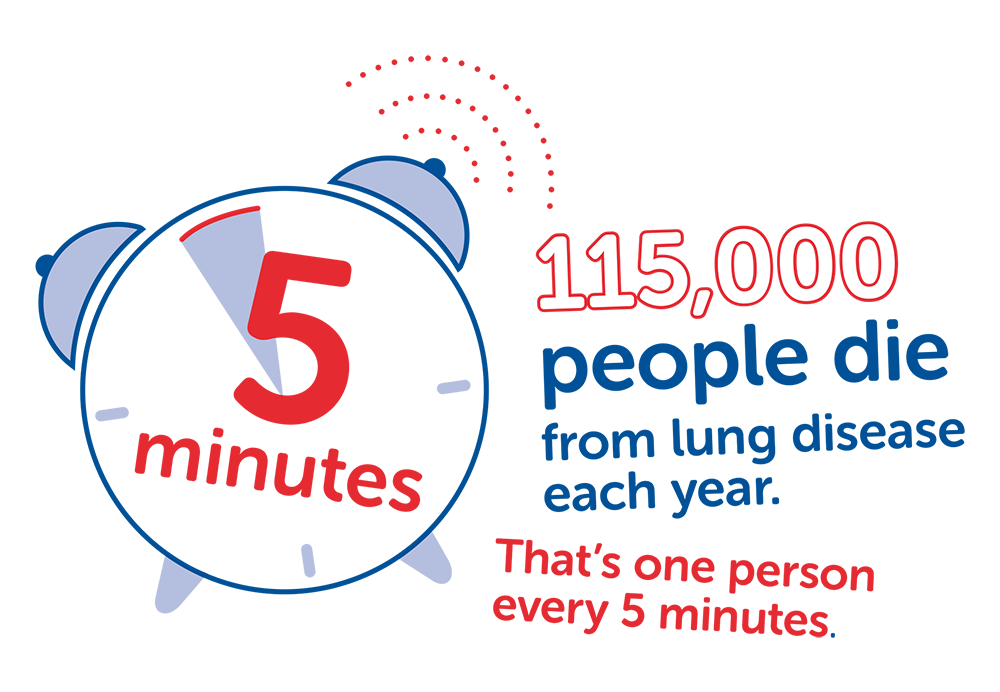Why lung health matters
We rely on our lungs to breathe properly. Struggling to breathe is not only frightening but dangerous, and can damage our health and limit what we can do. Living with a chronic lung condition only makes it more difficult to stay well and have the best quality of life.
Much of the suffering and harm faced by patients with lung disease is preventable. We know more can be done to tackle the root causes and improve the care and support that patients receive. This is why we formed the Taskforce for Lung Health.
We know too well what it feels like to go from being a person to being a patient. There is no greater change.
Taskforce patient representatives
Lung disease is a top killer in the UK
Lung diseases are the third biggest killer in the UK and cause 20% of all deaths annually. We have the highest rate of death from lung disease anywhere in Europe. People in the UK are three times more likely to die from lung disease than people in Finland, which has the lowest death rate in Europe.

Lung disease is the biggest cause of winter pressures on the NHS
Respiratory conditions such as asthma and COPD are the biggest contributor to winter pressures in the NHS. Hospital admissions for patients with lung disease have doubled in the last 20 years, with most of these being unplanned emergency admissions. Patients living with chronic conditions, such as asthma, find it harder to manage their symptoms and stay well during the winter. Rates of viral infections such as flu and RSV peak during the winter months, and can make people with lung conditions much more ill than those without, which is why it’s crucial to get any vaccines you are eligible for.
Asthma and chronic obstructive pulmonary disease (COPD) cost the NHS £9.6 billion in direct costs each year, according to PwC analysis [PDF, 1.1MB]. You can read more about the burden lung disease places on the NHS in Asthma + Lung UK’s ‘Saving Your Breath’ report [PDF, 4.9MB].
Not enough progress has been made to reduce illness and death
Progress in reducing deaths from lung disease has been much slower than for other major causes of death such as cardiovascular disease (CVD) and cancer. Avoidable mortality from CVD has improved by 58% on average across England in the last twenty years, but from lung conditions by only 14%. If deaths from lung conditions had fallen at the same rate as those from CVD, there would now be an estimated 8,000 fewer deaths from respiratory conditions each year.
While smoking rates have fallen significantly, smoking is still the biggest risk factor for developing lung diseases such as COPD. Environmental factors such as air pollution also play a role, especially in children, whose lungs are still developing and who are more vulnerable to the impact of air pollution and second-hand smoke. Public health measures such as greater funding for smoking cessation services, as well as stricter targets on air pollution, must be in place to reduce everyone’s chances of developing a lung condition.
Health inequalities are especially stark in lung disease
Nobody should face worse outcomes based on where they live or how wealthy they are. But this isn’t the case in respiratory health. The most deprived communities account for twice as many emergency admissions for respiratory conditions as the least deprived. The poorest 10% of people are also nine times more likely to die from a lung condition during winter than the richest 10%.
Children living in poverty also suffer the worst from lung conditions. Those in the most deprived communities are five times more likely to end up in hospital in an emergency over winter compared to children living in the richest communities.
Lung health just isn’t taken as seriously as a number of other conditions. It’s a big killer and very prevalent, yet we are not doing the best we can to help patients with respiratory conditions.
Dr Noel Baxter, PCRS
Learn more about the Taskforce for Lung Health.
